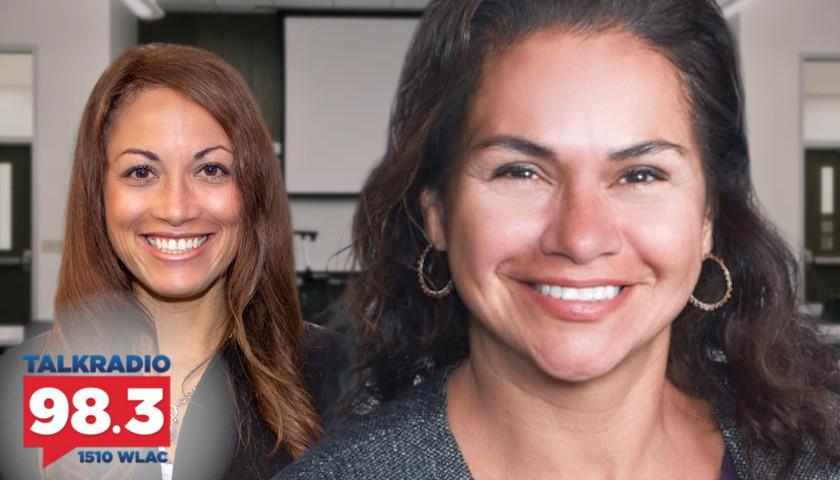Live from Music Row Wednesday morning on The Tennessee Star Report with Michael Patrick Leahy – broadcast on Nashville’s Talk Radio 98.3 and 1510 WLAC weekdays from 5:00 a.m. to 8:00 a.m. – host Leahy welcomed Tennessee Star education reporter TC Weber in studio to comment on the hiring Lizzette Gonzalez Reynolds as Tennessee’s new education commissioner.
Leahy: Right now, in studio, the best education reporter in the state of Tennessee, Mr. TC Weber. TC, I have a question for you.
Weber: Sure.
Leahy: Now, this might not be the nicest way to frame it. But I’m not always a nice person, TC. Governor Lee invited an educational tourist from California and Texas to be his first commissioner of education. We saw very little of Penny Schwinn in Tennessee.
Weber: Over the last six months.
Leahy: We have no idea where she was.
Weber: We have a better chance of getting an update from D.C. than you do from her.
Leahy: Oh yeah, exactly. She left and resigned on Monday. And Governor Lee looked all around the state of Tennessee, looked at all the teachers, all the legislators, and couldn’t find anybody qualified in his mind to be the education commissioner, and is bringing in another educational tourist, a woman by the name of Lizzette Gonzalez Reynolds, who as far as I know, has never taught in a classroom?
Weber: No, she’s never taught. This is one of the bizarre things about this and a long list of bizarre things. She was with the Texas Department of Education prior to going to Excel and Ed.
Leahy: She’s a native of Texas. She went to Southwestern College.
Weber: She went to Southwestern College. She started as a lobbyist.
Leahy: Another lobbyist.
Weber: So we are saying that somebody who has never lived in Tennessee and has never entered the building of a Tennessee school.
Leahy: As far as we know.
Weber: As far as we know who lives in Texas is qualified to tell us what the Tennessee school kids should do.
Leahy: And works for a Florida-based education company.
Weber: Excel and Ed, which is Jeb Bush’s thing. And a lot of people probably aren’t as familiar with them…
Leahy: Chiefs for Change.
Weber: It was a bunch of superintendents, and they got ’em all together. It was Chris Surf and John White. And it’s funny because out of the 13 original members, nine of them were either indicted or fired. (Leahy laughs) So then they decided that maybe they ought to expand their outreach a little bit and let people that were just secret directors…
Leahy: Non-criminals?
Weber: Non-criminals might be a good idea. (Leahy laughs) But anyways so they let them in, and then there was a falling out, and Jeb moved over to Excel and Ed. And Excel and Ed have been more of his vehicle than Chiefs for Change.
But the two, all Gates-funded, all working in concert and all influencing behind the scenes. And now, when it comes to Gonzalez, keep in mind I’d be willing to bet that she’s been working in the state for probably six to eight months, if not longer.
Leahy: Here in Tennessee.
Weber: In Tennessee. People probably don’t know, and many people don’t know Penny Schwinn used these outside groups like SCORE, Excel, and Ed, Chiefs for Change to help because she couldn’t keep staff members at the Department of Education. She would use these organizations to assist with the process. So Excel and Ed helped with the passing of TISSA and getting that bill.
Leahy: Tell people what TISSA is.
Weber: TISSA is the BP.
Leahy: Tell people what the BP was. TISSA is the new school funding formula. BP was the old funding is the new school funding formula.
Weber: And the difference is negligible. What they say is that the money follows the student. But what it does is it doesn’t really, because what happens is there’s a student calculation, but the state can’t tell the district what to do with their money. So every district gets pushed their money and they do with it what they want. So technically, it’s still the same funding plan. It just has a different name and a different ring to it.
Leahy: Well, that’s encouraging. (Laughter)
Weber: No, not so much.
Leahy: Just broadly speaking, funding of local K-12 public education, roughly it’s about 10 percent from the federal government. About what, 45-50 percent from the state?
Weber: Roughly about 38 to 40 percent. Locals pay about 60 percent.
Leahy: And that’ll vary though the state in poorer districts, the state will pay more.
Weber: Correct.
Leahy: And that’s what this TISSA formula is.
Weber: Yes. And that’s deciding how much the state is gonna kick in.
Leahy: So whenever we talk TISSA and BEP, I start to get a headache. (Laughter)
Weber: You’re not the only one. You are not the only one.
Listen to today’s show highlights, including this interview:
– – –
Tune in weekdays from 5:00 – 8:00 a.m. to The Tennessee Star Report with Michael Patrick Leahy on Talk Radio 98.3 FM WLAC 1510. Listen online at iHeart Radio.
Photo “Lizzette Gonzalez Reynolds” by PIE Network.






Cut the fraud waste and abuse, eliminate Federal and State Departments of Education, end social justice engineering in education……. Never mind, that makes to much sense and would put to many academic experts out of work. Of course on the other hand children might actually begin to learn.